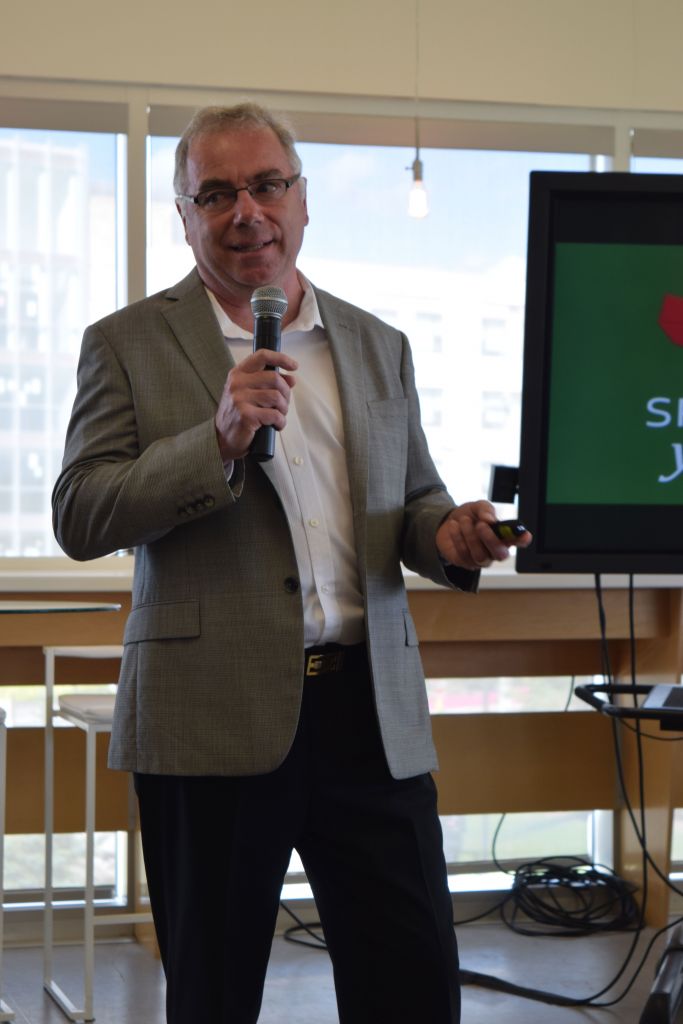Personal finance was the subject of the author of Wealthing like Rabbits, Robert R. Brown’s visit at the college on Sept. 27.
Opening the floor was the Director of Students Support Services, Shelley Styles, who stated that finances are what cause people stress, which underlined the need of inviting Brown to the college to speak to students and staff alike.
Brown also believes that students should be taught financial resposibilities citing his desire to “to see students graduate with as little debt as possible.”
Brown started off by thanking the organizers, insisting that his talk is about the intricacies of finance rather to talk about financing in personal terms.
His book, Wealthing like Rabbits, is an “introduction to personal finance using pop culture,” Brown said.
Using rhetorical questions, Brown noted that spending is something that depends on the individual’s means.
“Should you buy a new or used car?” Brown asked. “It depend on your personal situation.”
He added: “Should you use spend your last $50 on grocery or at a student pub tomorrow night? I would suggest that it depends on your personal situation.”
The old adage: restraining from buying things that you don’t need with the money you don’t have just to impress people you don’t like, was echoed by Brown.
Brown also introduced three rules that, when properly implemented in a person’s life, are keys to having a life with minimized debt.
“There are underlining rules, truisms,” Brown said. “Foundations of personal finance that apply almost to everyone. How we integrate these rules in our lives is going to be different from person-to-person and from situation to situation because it is so personal; but these rules rarely change.”
According to Brown, the rules that are essential when trying to minimize your debt are: Dumb consumer debt, spending wisely and screwing the Joneses.
“I would like to call these rules the big three,” Brown said. “The reason I call them the big three is because I honestly believe that when someone stays true to these rules or philosophies, as they go throughout their lives, they will be well on their way to a very bright and a very secure personal financial future.”
Brown contrasted the old days of big tobacco advertising to young people and the new days of credit card companies doing the same. “Maybe we haven’t come a long way,” Brown said.
Brown told a story of how, when he took his oldest daughter to York University, he noticed people incentivizing students to sign up for credit cards.
“One of the marketing material said ‘easy access to credit with no income requirement’,” Brown said. “We will gladly lend you money even though we know, at this point in your life, you probably don’t have the ability to pay it back.”
Brown warned people of relying on credit cards, though, he conceded that credit cards do serve a purpose to some.
“I am not saying to stay out of all debt,” Brown said. “As a personal financial commentator and an author, I always do whatever I can to encourage people to minimize their debt load; but at the same time, I recognize that it’s pretty hard for most people to buy a house or a condo without taking out a mortgage.”
“I understand that a car can break down at an inconvenient time and at the time you don’t have $25,000 sitting around in a bank account, so you might need to borrow.”
Brown is not against spending money, in fact, he encourages people to spend most of their money but also set aside 10 per cent of their income.
Brown also asked the attendees to be wary of companies he called “legalized loan-sharking” also commonly known as pay day loans.
“They are popping up everywhere now,” Brown said. “There is that ‘if you need to borrow money, they can get it to you quickly without a lot of red tape or a lot of hassle’, but they are unbelievably expensive.”
With one last rhetorical question, one that highlighted the need to minimize debt, Brown capped off the afternoon.
“If you could look at your self 40 or 50 years from now,” Brown asked. “Who would you rather be: someone who has $500,000 in the bank and virtually no debt or somebody who’s approaching 50 with $500,000 and no savings?”
The event was organized by Student Support Services in collaboration with the AC Hub and Financial Aid.


